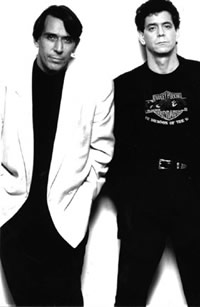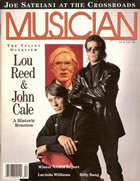

Interviews
Bloodied but Unbowed
Interview by Scott Isler. Published in Musician no. 126 - April 1989
Violence, Viola and Enigma Variations

The Falklands Suite grew out of an early-'80s desire on Cale's part to set Dylan Thomas to music – "partly to find out what musical sounds worked with the internal rhythmic clatter of the words," according to Cale's notes for the piece. He also used the opportunity to throw in the pedal steel guitar he had earlier written into the string quartet and then taken out. "I showed it to somebody and they just threw their arms up in the air and said, 'You can't do this. You can get steel players who have great ears but very few of them can read."'
Later, however, Cale met Joshua Dubin, a musician who says he's "very much into trying to do different things with the steel guitar." Cale, Dubin adds, "was as unfamiliar with steel guitar as I was with his music," but the composer still "wanted a certain sound," and Dubin was willing. The Falklands Suite had its world debut on Dutch television, played by the Metropole Orchestra "which spends most of its time doing Nelson Riddle arrangements," Cale says. "These guys are bureaucrats: 'Don't fuck with me, Jack, I've got tenure.' They're all very well dressed and totally disinterested."
Cale is just as critical of himself. He prefers the string writing in Sanctus, done on a computer, to that in The Falkiands Suite. The latter is "a mixture of The Sound of Music and Benjamin Britten," and he wants to revise the score, which "sticks in my craw." He's hardly more lenient toward his only recorded orchestral work so far; the miniatures on his 1972 album The Academy in Peril. "Most of that was padding," Cale says, "holding chords. But it had a few moments of original noises from the orchestra."